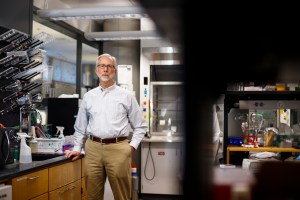Matthew Shair imitates, improves on nature
“We’re interested in making things that have new biological and chemical properties”
Matthew Shair and his students work in “protein trafficking.” Genes in living cells carry instructions for making proteins essential to life. These proteins have to get from place to place in the cells and to destinations outside the cells. It’s like traffic on a busy freeway. The problem Shair set for himself was to find traffic “cops.” The process of searching for them should lead to new discoveries about basic biology. In addition, molecules found to perturb protein traffficking can be involved in disease. Studying them could be the first step in finding better treatments. Using biomimetic synthesis, two graduate students, Henry Pelish and Nick Westwood, made a library of about 3,000 molecules that they guessed might be the types that cause protein traffic jams. These molecules were tested with the help of a screen developed by Tom Kirchhausen and Fen Feng at Harvard’s Institute for Chemistry and Cell Biology. The screen serves as a sort of radar that can spot cell-traffic violators by allowing researchers to see, with the help of a microscope, what is actually going on in a cell. The team actually found one of the 3,000 molecules that interrupted the normal flow of protein traffic.





